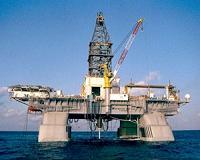 |
Brussels (AFP) July 25, 2010 The European Union will hit Iran with tough sanctions against its vital oil and gas industry on Monday in a bid to lure Tehran back to the negotiating table over its disputed nuclear programme. "This (package of sanctions) is about applying pressure, but applying pressure in order to bring the Iranians to the table to talk," a European diplomat said. EU foreign ministers will formally approve the sanctions following Iran's repeated refusals to halt sensitive nuclear activities, which the West fears are aimed at building a bomb. Iranian President Mahmoud Ahmadinejad warned the EU against imposing unilateral sanctions, in remarks directed at the EU, which were translated into English by the Press TV channel. "We do not welcome any tension or a new resolution. We seek logic and friendship," Ahmadinejad said. "I should tell you that anyone who adopts a measure against the Iranian nation, such as inspection of our ships and planes, should know that Iran will react swiftly," he added. Although the UN Security Council imposed a fourth set of sanctions on Tehran in early June, EU leaders and the United States decided shortly after to impose their own penalties against the Iranian energy sector. The sanctions are part of a twin-track approach, with EU foreign affairs chief Catherine Ashton seeking to revive moribund talks between Iran and six world powers -- Britain, China, France, Germany, Russia and the United States. Western powers have demanded that Iran suspend its uranium enrichment programme, fearing that Tehran would use the material to build a nuclear bomb. Tehran says its atomic programme is a peaceful drive to produce energy. The new EU sanctions include a ban on the sale of equipment, technology and services to Iran's energy sector, hitting activities in refining, liquefied natural gas, exploration and production, diplomats said. The EU will ban dual-use goods that can be used for conventional weapons. It will also step up vigilance of the activities of Iranian-connected banks operating in the EU and bar them from setting up branches. "A number of (EU) member states have had to overcome considerable problems with their economic interests in order to adopt this package," the European diplomat said. "It will be in some way the most substantive and far-reaching autonomous sanctions package which the EU has adopted against Iran or any other country," he added. Iran is the world's fourth largest producer of crude oil, but imports 40 percent of its fuel needs because it lacks enough refining capabilities to meet demand. The unilateral US and EU sanctions were "expected to have a material impact on the country's energy industry," the International Energy Agency said last week. It was "significant" that China and Russia had agreed to back the UN sanctions, but that those did not include specific measures aimed at Iran's energy sector, the IAEA noted. The US and EU sanctions were harder, and "longer term, development of the country's oil and gas industry will clearly be adversely impacted," the IEA said. "These sanctions are surprisingly strong," said Mark Fitzpatrick, director of the nonproliferation programme at the International Institute for Strategic Studies in London. "They go much further than the UN sanctions." As tough as they were however, they could persuade Iran back to talks, he added. "In the past, Iran has always moved once it was under pressure of the international community." The last high-level talks between Iran and the six world powers were held in Geneva in October 2009 when the two sides agreed a nuclear fuel swap that has since stalled. EU foreign ministers meeting Monday will urge Iran to set a date for new talks, according to draft conclusions. Iranian Foreign Minister Manouchehr Mottaki, during a visit to Istanbul Sunday, said Iran was ready to start talks immediately with Western powers over a nuclear fuel swap deal, brokered by Turkey and Brazil in May. Under the deal, Iran agreed to send 1,200 kilogrammes of its low-enriched uranium (LEU) to Turkey to be supplied at a later date with high-enriched uranium by Russia and France. But this deal has already been dismissed by world powers, who backed the renewed UN sanctions in June.
Share This Article With Planet Earth
Related Links Powering The World in the 21st Century at Energy-Daily.com
 Alarm on Gulf oil rig muted before blast: witness
Alarm on Gulf oil rig muted before blast: witnessNew Orleans (AFP) July 23, 2010 An alarm that should have alerted workers on the Deepwater Horizon oil rig to a deadly build-up of gas that sank the platform, sparking a huge oil spill, had been muted months before, a former rig worker said Friday. The alarm system which uses lights and alarms to warn of fire or high-levels of toxic or explosive gases, had been "inhibited," Mike Williams, the chief electronics technician o ... read more |
|
| The content herein, unless otherwise known to be public domain, are Copyright 1995-2010 - SpaceDaily. AFP and UPI Wire Stories are copyright Agence France-Presse and United Press International. ESA Portal Reports are copyright European Space Agency. All NASA sourced material is public domain. Additional copyrights may apply in whole or part to other bona fide parties. Advertising does not imply endorsement,agreement or approval of any opinions, statements or information provided by SpaceDaily on any Web page published or hosted by SpaceDaily. Privacy Statement |